This Papo tigress #50003 was first released in 2004 and retired in 2012 as part of their Wild Animals line and was also included in their gladiator series of figures; there was a fighting male lion figure alongside her.
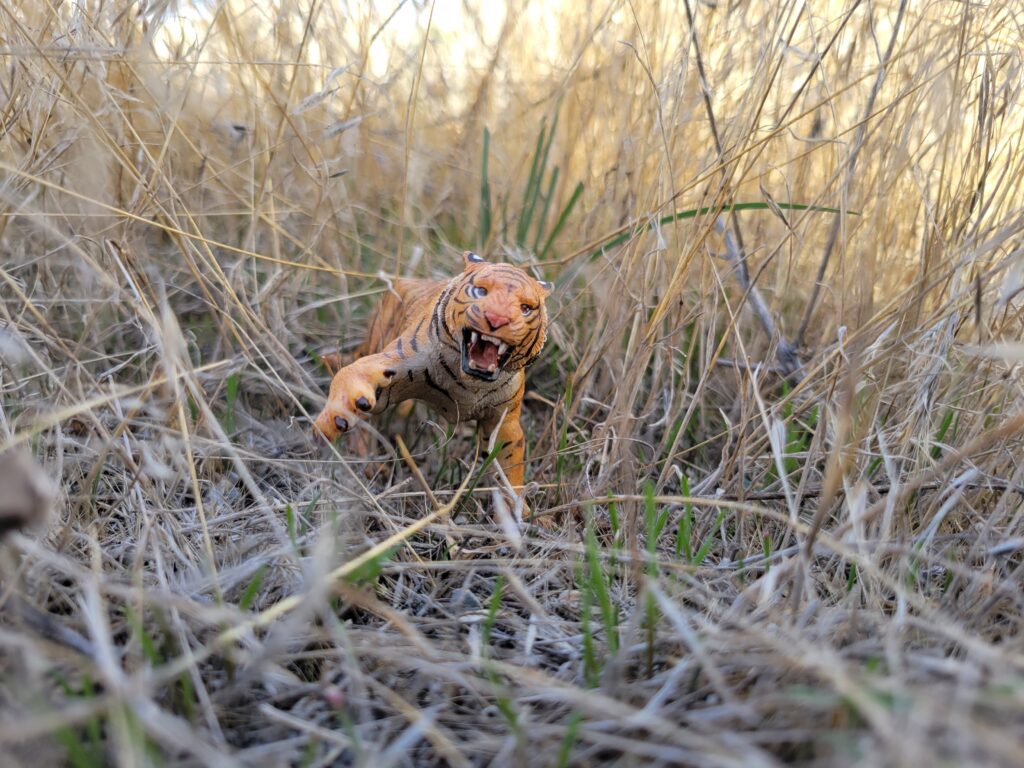
The following post will regale yet another tale of an animal with a predilection for human kills. Last year, I presented the story of la Bete du Gévaudan; a folktale of a murderous large wolf or dog that stalked France in the medieval period. This next story is much more contemporary- having taken place around the turn of the 20th century. Champawat India gained a striped killer stalking its jungles- and gained what many locals of the area heralded as a true hero. The following is the story of vanquishing a feline demon…
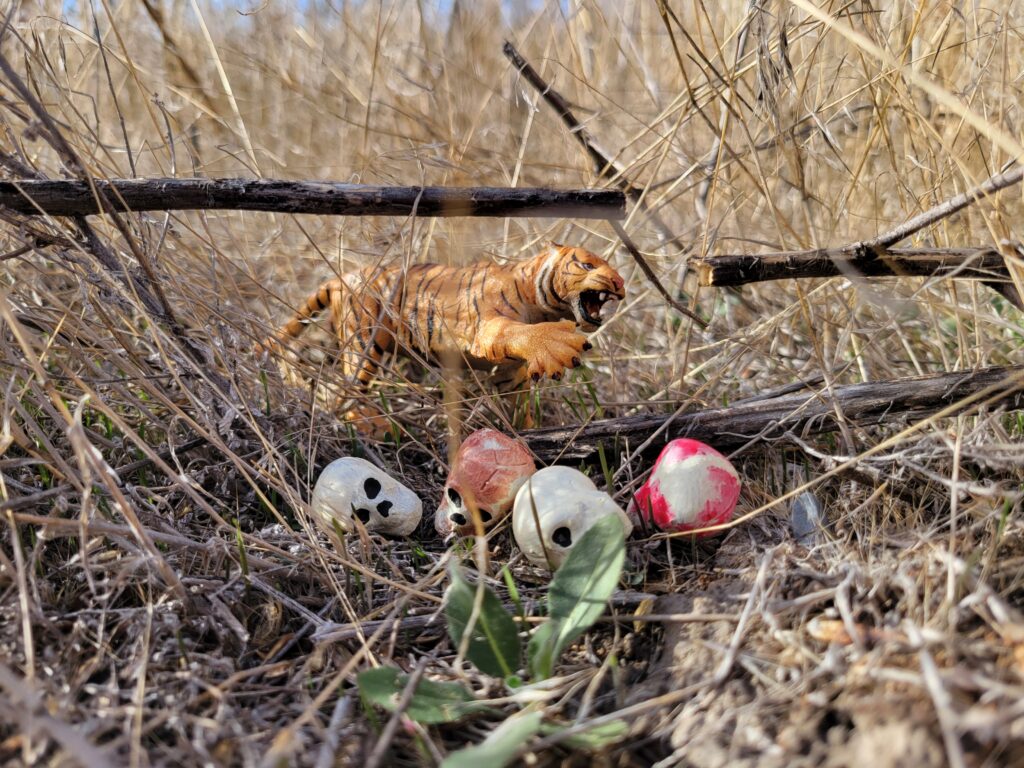
There once was a man-eating tigress who stalked the hills of Champawat India in the early 1900s- a story that might just chill you to the bone. Jim Corbett, a famed hunter, tracker, naturalist, and author, penned her story from his excursion in the region- and it is a story that enthralled me when I first read it in his title Man-eaters of Kumaon.
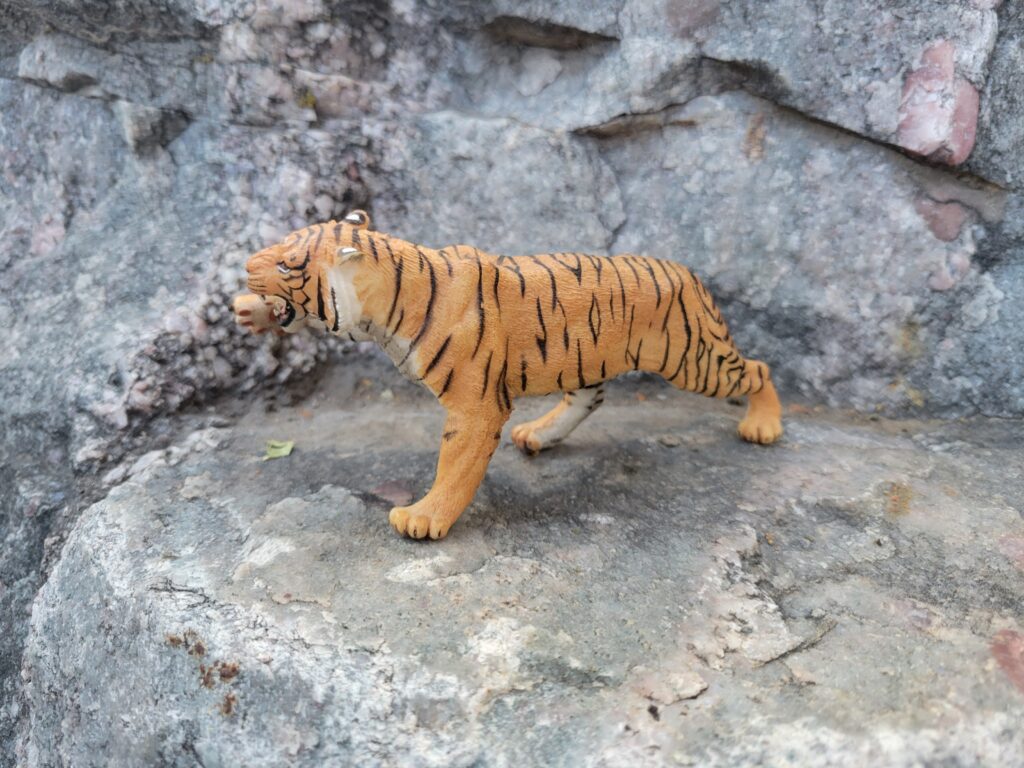
This tigress first began her career in hunting mankind while still in Nepal; she is claimed as to have mauled and devoured at least 200 people before she was chased westward into neighboring India. She settled in the Champawat region and began stalking from the foliage and preying upon any unlucky individual she encountered. In Jim Corbett’s retelling of this tale, he first heard if this animal early on in his dangerous game hunting career. Before he agreed to even attempt to find this animal in the region, he asked that the government rewards for her be cancelled immediately and all hunters in the area be withdrawn (citing that for one, he did not like to be classed as a reward hunter, and then also to reduce his and others risk of accidentally getting shot). A woman was reported killed shortly after this discussion, and Jim set off to address this maneater in person. He arrived in the town of this event after 5 days of travel and found the townsfolk shuttered away in their homes for fear of this monster. The tigress attacked her victim while she and two others had left town to collect leaves for their cattle. The victim was the first to complete her task and was climbing down her tree where the tigress had been waiting and then lunged, quickly ending the victim’s life, and carrying her off into the woods to be consumed. This tigress was then seen and heard for the following 5 days roaring from the grass on nearby roads and roaming neighboring fields. At this time, she successfully terrorized the rescue party beyond any possible hope of retrieving the body for a proper religious cremation.
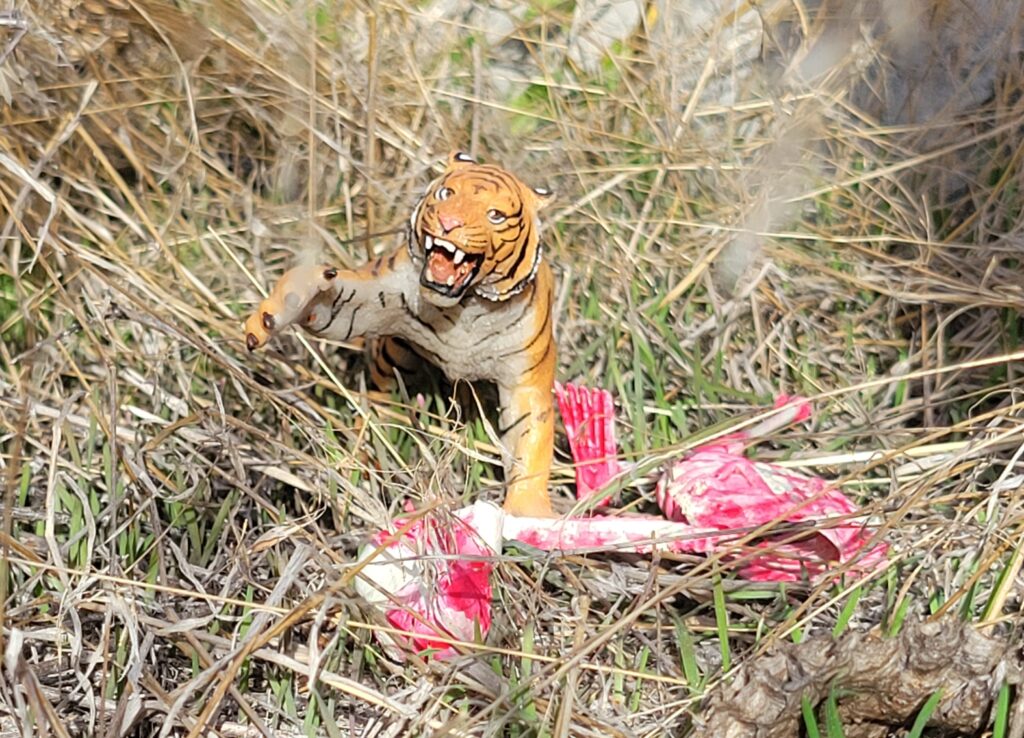
Using well developed tracking skills Mr. Corbett was able to retrieve a small portion if the body and return it to the woman’s family. After this had been completed, he was taken to investigate yet another recent attack. Another woman who had been out cutting grass was quickly taken by the tigress. Despite the woman’s sister pursuing the animal some ways into the nearby woods, she was foiled when the tigress dropped the victim and then charged towards her. The sister was able to escape harm and return to the village to raise the alarm; however, she would lose her ability to speak due to the shock of all that had happened. Mr. Corbett located and affirmed to this woman that he would find her sister’s killer, despite his misgivings about the difficulty of doing so.
Corbett spent 3 days visiting all the surrounding villages and traversing the jungle to gain an understanding of the land. He then encountered a group of men who had witnessed yet another killing some time previous. They heard screaming and wailing from the jungle whereupon the beast walked out of a stand of trees carrying yet another young woman who had been out collecting sticks when she was attacked. The group of men were too afraid to act or try to recover the victim due to this tiger’s established violent streak; but they were able to direct Mr. Corbett onto the trail. After traversing the length of the valley, they did recover the uneaten body of the young woman. A few days after this (while excluding some of the author’s digressions and false starts on the hunt for this tigress) yet another victim was claimed. Late in the morning, in a village below the hill where Mr. Corbett had stayed the night, a dozen people were collecting sticks when another young girl was snatched. A young fellow was immediately dispatched to alert Mr. Corbett. Once he reached the village below, he discovered that her fellow workers were too frightened to look behind and see what direction the tiger ran off with her latest meal. He easily followed the trail through both briars and nettles (much to his discomfort), and down a steep water course to a pool at the end. At this stage, the pursuer made a nearly fatal mistake. He discovered a portion of the body, partly eaten, on the far side of the pool and upon viewing it with great distress, he suddenly felt he was in great danger. Looking up the bank in front of him and swinging his rifle up to cover his exposure, he narrowly saved his life from being the next victim. The swing of the gun inspired the tigress to quickly spring away; with Mr. Corbett in hot pursuit. She was easily followed as the remaining portion of her victim she was carrying left a clear trail for him to follow as he chased her. The tigress began to growl periodically in bad temper at being so forcefully followed, which only helped her pursuer gain on her lead. This chase took course over some 4 hours before it began it get dark. Mr. Corbett was forced to turn back and took care to bury the previously abandoned portion of her kill to recover later for her family for burial. Over the course of the night, Mr. Corbett anticipated and accurately predicted the tiger’s movements and behavior over the next few hours before he could implement a plan to end her ferocity.
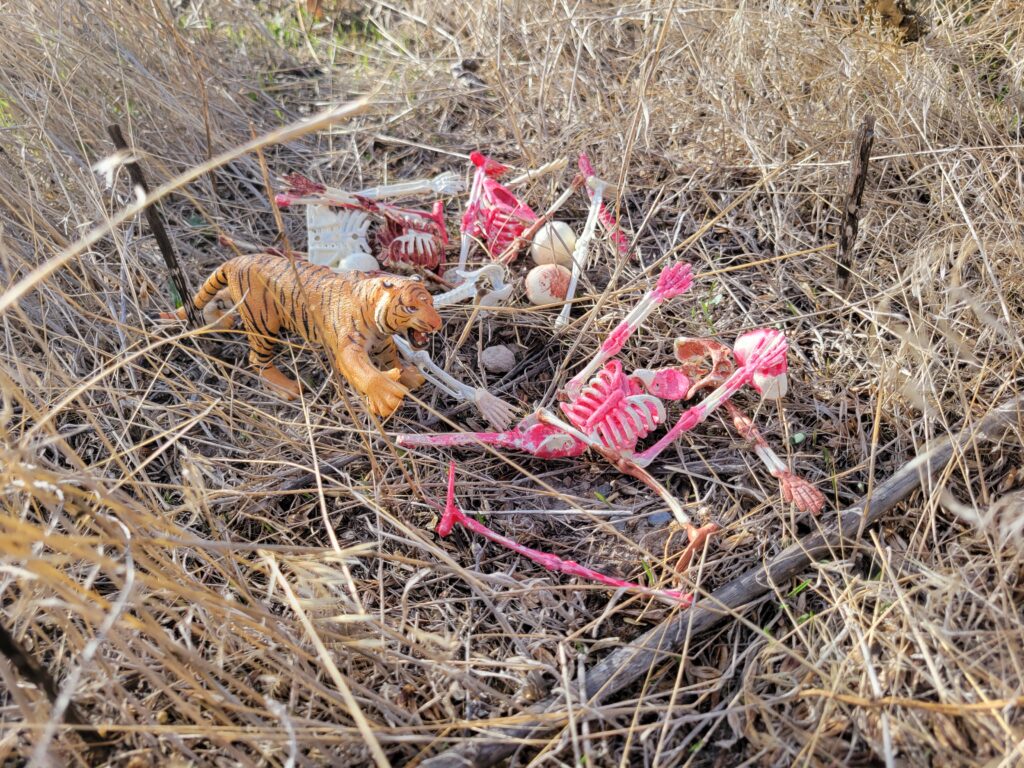
With an excellent understanding of the landscape through the gorge and the behavior of these large cats, he arranged an enormous party of “beaters” to group up in the morning to spook and effectively herd the tigress down the hills and into the gorge. Despite an arguably ingenious plan that was slightly off played by the involvement of the gathered men who began beating before Corbett was in the proper position; the following was an effective dispatch of a dangerous animal. The tigress sprinted for the gorge right where Corbett had anticipated her. He fired his first shot which stopped her in her tracks, and she now knew exactly where her enemy was now. He quickly fired another shot, at which point she turned and ran further off, climbing boulders up the side of the gorge. Corbett’s rifle was now empty, as he only carried a few cartridges with him on any trip, and a panic ensued. Luckily, the local Tehsildar (who from my understanding is a village revenue officer) was able to offer up his own rifle to Corbett after he had to back track some dozens of yards to the man to retrieve it. Then returning within 20 feet of her, at this point, Corbett discovered a 3/8 inch gap between the breach lock and the barrels of the gun which could cause horrendous injury and even death if fired. Shoving his horror aside and taking the risk anyway, he fired upon the tigress. The gun was unforceful and instead of hitting its mark he aimed for in her head it, instead landed in her right foot. Luckily, this was enough of a “tap” for the animal to then accept defeat; falling dead upon the boulder she had climbed upon.
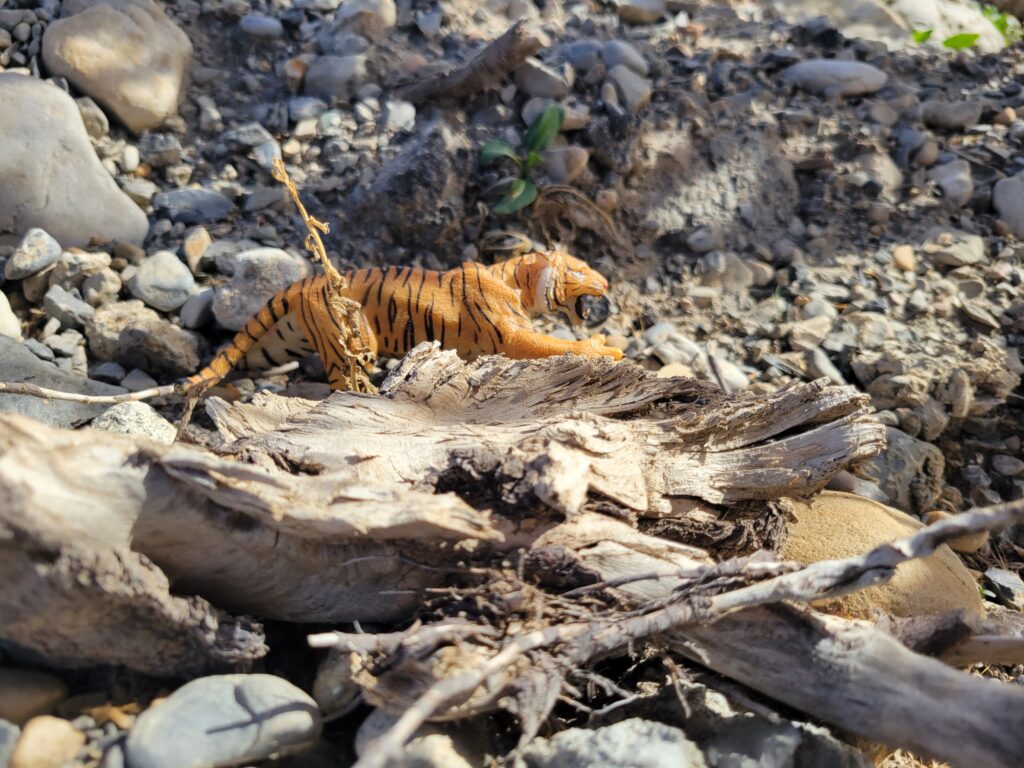
Upon examination, the tigress’ mouth showed the reason for her aggression and predation. The canine teeth on her right side were broken; the upper in half, and the lower down to the bone. Corbett presumed this was the cause of a poor gunshot and surmised that it “had prevented her from killing her natural prey and had been the cause of her becoming a man-eater”. The tigress’ body was then paraded along to all the villages where she once terrorized; in order to soothe the anxiety of all who lived in fear of her. That night the villagers were thrilled to once again traverse the roads and hills that had been haunted by this striped terror for 4 years in total.
Mr. Corbett made a special effort to present the skin of the animal to the voiceless woman whose sister had been killed. She had been driven voiceless for the last 12 months because of this animal, but upon seeing it once again she soon then recovered her voice and marveled at the end of this nightmare. Mr. Corbett would go on to assist in ending the crusades of numerous man-eaters (both leopards and tigers) in the region. The skin of this animal was sent to the National History Museum in London, where it is believed to be retained in their collections to this day. This tigress is credited to have amassed some 436 human kills and was finally vanquished in 1907.

And now for the actual review portion of the figure. This model is that of a female tiger set in an aggressive posture, snarl and all. The first thing that stands out to me on this figure is the gracile body type- this screams that this model is a young adult tigress in the prime of her life. The primary feature of this figure is the obviously aggressive nature to it. The tigress has a wide stance for balance, with 3 feet supporting her body in a tripod configuration while the right forepaw is raised and reaching for her victim/aggressor with the toes widely splayed and her claws clearly visible. Noticeably, and a nice feature that the sculptor included, is that the claws on her other 3 feet are vaguely sculpted and painted, but are obviously sheathed while they are unused. The tail is slightly carried away from the body, possibly to aid in balance, while the end of the tail is twitched to the right side just so; anyone who is familiar with a living room tiger (your domestic pet cat) knows all too well that this tail twitch is the sign of arousal in the animal. Either preparing an attack or is prepared for a defensive response from an attacker. This tigress has wonderfully muscled haunches and shoulders, you can even see the ripple of muscle across the ribs on her torso- this all gives a certain energy and motion to the animal, even if it is only plastic. As expressive as the tigress may be in her body language, she also has an incredibly expressive face. The tigress’ head is where most of the emotion has been captured; her mouth is open wide baring her fangs and carnassial teeth, her black painted lips snarled over them in curled contempt. Her pink nose is matched by a pink tongue and throat- the threat of swallowing you up inside contained in their rosy flesh. Her eyes are simultaneously wide open to watch every movement, but her brows and lower lids are tight with the anxiety of her impulse to fight. Her ears are tipped nearly flat back, exposing the white spot encircled with black fur that appear as her second pair of eyes. The entire figure is masterfully done by whomever sculpted her; they stayed faithful to the drama of a gladiator event, while also maintaining the wildness of a real tiger. If one were to place her in the story from Jim Corbett, you can see why this particular man-eater was so entirely feared. This is one tiger that I would certainly not want to tangle with. She is a harder to obtain model now, but if you enjoy models with expression or action, want some sexual dimorphism present in your tiger collection, or even just enjoy the tale I retold above, I recommend tracking down this beauty for your shelves.
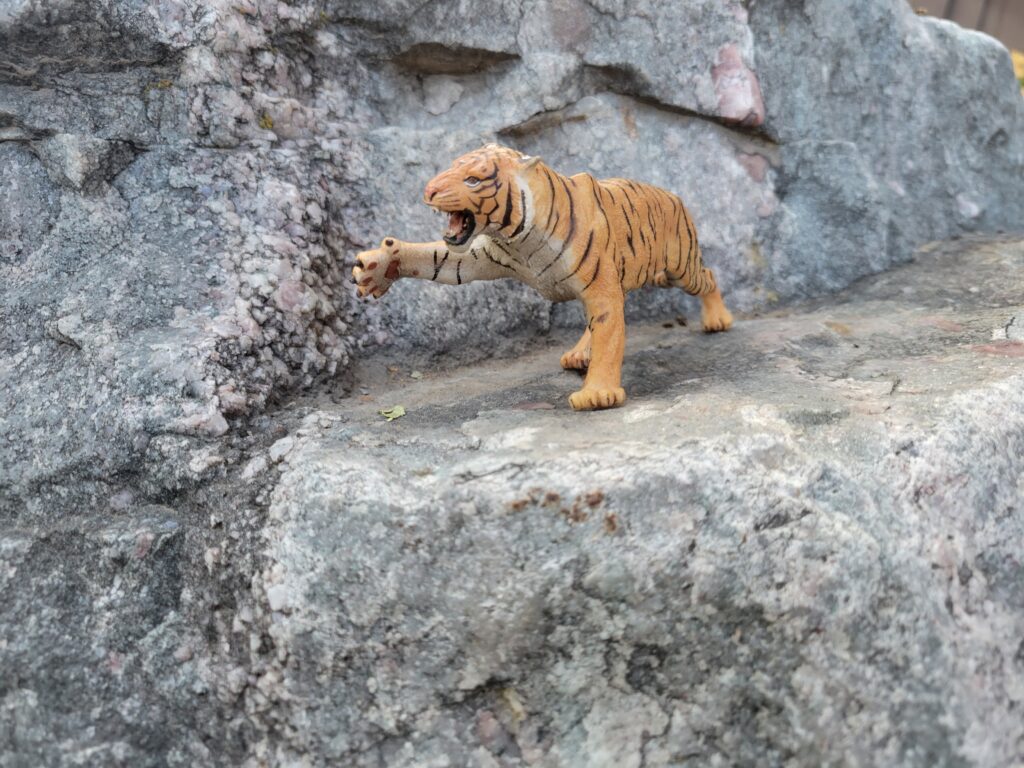
Disclaimer: links to Ebay and Amazon on the AnimalToyBlog are affiliate links, so we make a small commission if you use them. Thanks for supporting us!




Not only is the backstory appropriate for this month’s theme, but, hey…tigers come in Halloween colors!!! 😀
An unconventional choice for spooky season, but you made it work! I have a 1946 copy of Man-Eaters of Kumaon, first American edition.
Holy shoot what a story! Amazing historical account. 🐅